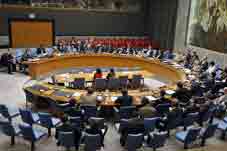The World Supports Georgia
By Shorena Labadze
Monday, August 11

On August 9 the Ministry of Foreign Affairs of the Republic of Latvia issued a Joint Declaration on the situation in Georgia made by the Presidents of the Baltic states and the Republic of Poland. President of Estonia Toomas Hendrik Ilves, President of Latvia Valdis Zatlers, President of Lithuania Valdas Adamkus and President of Poland Lech Kaczynski said they “strongly condemn” Russia’s military actions towards Georgia, adding that “the Russian Federation has overstepped a line whilst claiming to be preserving peace and stability in the conflict zone and protecting Russian citizens outside its own borders” and “[Russia] abuses its EU-given privilege to claim intervention rights when making statements such as "we are protecting Russian citizens" in South Ossetia”.
The Presidents suggest the following way out of the situation: “The EU and NATO must take the initiative and stand up against the spread of imperialist and revisionist policy in the East of Europe. New international peacekeeping forces should be created as the current arrangements have proved to be ineffective”. They pledge the situation “will not be passed over in silence or with meaningless statements”.
The Presidents also state that they regret not giving the NATO MAP to Georgia. “We regret that not granting a NATO Membership Action Plan (MAP) to Georgia was seen as a green light for aggression in the region,” the declaration reads.
On August 7 the Spokesperson for UN Secretary-General Ban Ki-moon expressed his “serious concern about the mounting violence in South Ossetia”. He called on the parties “to refrain from any action that could further escalate the situation and threaten the stability of the region”. The Security Council held three emergency meetings in 36 hours between 8-9 August to discuss the situation in South Ossetia, “but so far [it] has been unable to reach agreement on any formal action”. During the Security Council meetings the representative of the United States called on the parties to respect the territorial integrity and sovereignty of Georgia. He said “The Russian Federation should pull back its troops and not inflame the situation by sending its forces into Georgia”.
On August 8 the Office of the High Commissioner for Human Rights (OHCHR) called on both sides to show restraint. The office urged the parties "to show the utmost restraint and -- under all circumstances -- to ensure full respect for international humanitarian and human rights law, in particular the right to life, liberty and security of the person.” US President George Bush also made a special statement concerning the Russia-Georgia conflict in Beijing, calling for an "immediate halt to violence". He added "The United States takes this very seriously."
Subsequently the UN Secretary-General released a statement in his own name, saying that he is “profoundly concerned.” “The Secretary-General is alarmed by the escalation of the hostilities in Georgia which have resulted in large numbers of casualties and massive destruction in South Ossetia and other regions of Georgia. The Secretary-General is particularly concerned about violence spreading to areas outside the zone of the Georgian-Ossetian conflict”. The Secretary-General also urged the parties to respect the principle of territorial integrity. “The Secretary-General urges all parties to respect the principle of the territorial integrity of states enshrined in the Charter and to refrain from actions that could undermine efforts to settle the longstanding conflicts in Georgia”.
The UN Assistant Secretary-General for Peacekeeping Operations, Edmond Mulet, also made a statement expressing his concern. “At this point we are particularly concerned that the conflict appears to be spreading beyond South Ossetia into Abkhazia," he said.
On August 8 the OSCE Chairman-in-Office, Finnish Foreign Minister Alexander Stubb, recommended that military action in the conflict zone be brought to an end. "The intense fighting in the South Ossetian conflict zone contains the risk of escalation into a fully-fledged war. War would have a devastating impact on the entire region. I urge the Georgians, South Ossetians and Russians to agree a ceasefire, end military action and put a stop to further escalation," he said. "We need to pull back from the brink of a fully-fledged war." The Chairman condemned the bombing of the OSCE Mission premises in Tskhinvali, adding that "the international community needs to act together to prevent a fully-fledged war”.
According to Ukraine’s Foreign Ministry Ukraine has warned Russia that it will forbid Russian navy ships to return to their base in Crimea because their deployment on Georgia's coast may involve Ukraine in the conflict.
Pope Benedict, in Northern Italy on holiday, expressed “profound anguish” that the bloody confrontation "has already created many innocent victims and forced a great number of civilians to leave their homes". The Pope urged the world community to help the various parties resolve the problem. "I invite the international community and the countries with the most influence in the current situation to make every effort to support and promote initiatives aimed at finding a peaceful and lasting solution," the Pope said. The Pope added that he prays for peace in Georgia.
France President Nicolas Sarkozy has also expressed “deep concern” about the tragic situation currently existing in Georgia.
